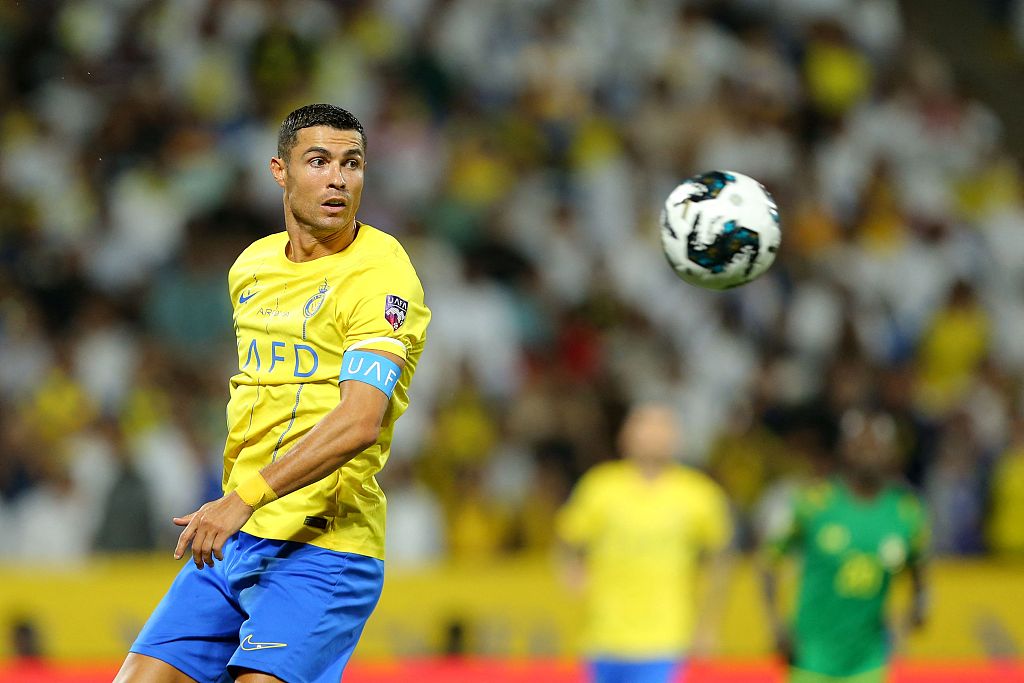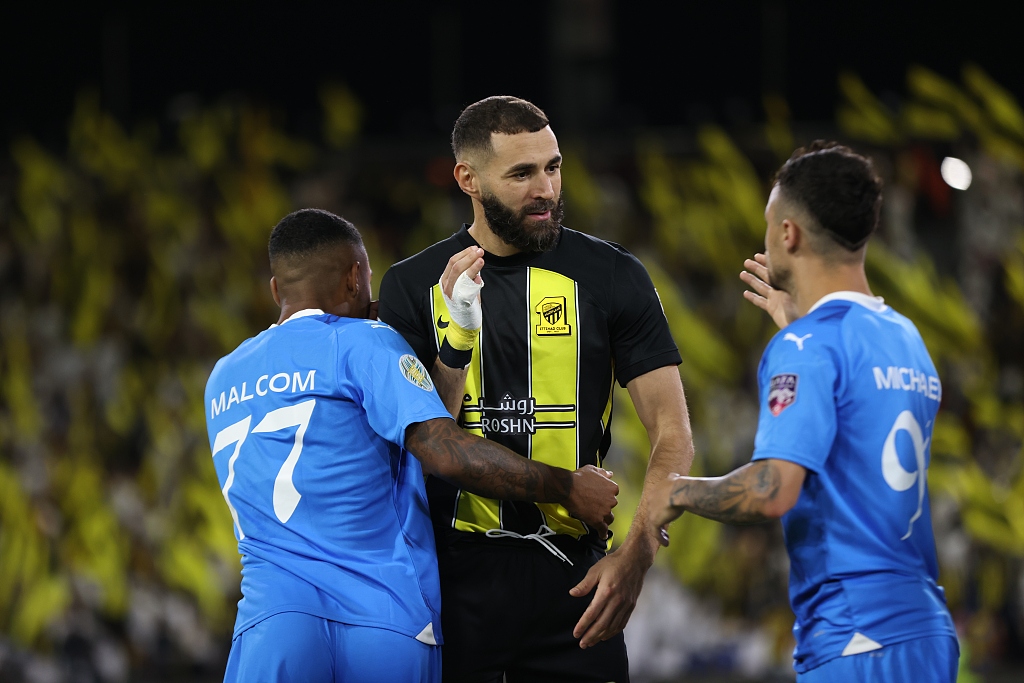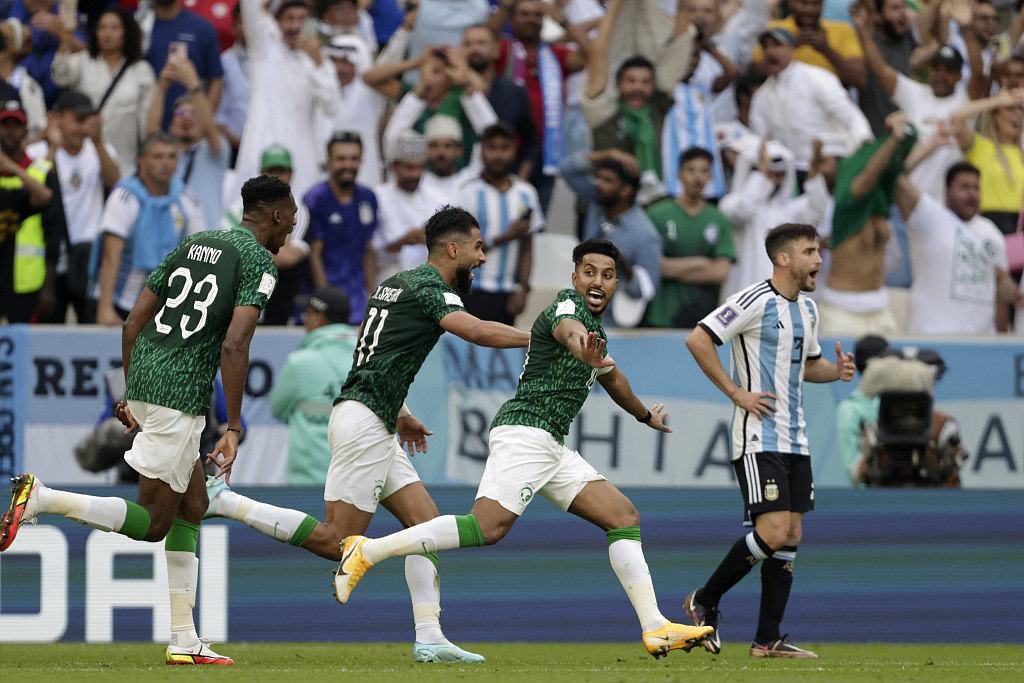
Al-Nassr's Portuguese forward Cristiano Ronaldo eyes the ball during the 2023 Arab Club Champions Cup semi-final football match between Saudi Arabia's Al-Nassr and Iraq's Al-Shorta at Prince Sultan bin Abdul Aziz Stadium in Abha on August 9, 2023. /CFP
Al-Nassr's Portuguese forward Cristiano Ronaldo eyes the ball during the 2023 Arab Club Champions Cup semi-final football match between Saudi Arabia's Al-Nassr and Iraq's Al-Shorta at Prince Sultan bin Abdul Aziz Stadium in Abha on August 9, 2023. /CFP
When Cristiano Ronaldo signed for Al-Nassr last December, many eyebrows were raised across the football world. The Portuguese superstar signed on the dotted line for the Riyadh-based club shortly after his acrimonious exit from Manchester United, choosing the Saudi Pro League (SPL) over extending his stay in Europe.
Nevertheless, a star footballer moving to Saudi Arabia in his late 30s was not really the kind of transfer that would fundamentally alter world football's power dynamics.
However, if the string of high-profile transfers to the SPL this summer is any indicator, Europe's status, or specifically that of its top five leagues, as football's global seat of power is set to be challenged in the coming years.
The new season of the SPL begins this Friday evening, with Al-Ahli taking on Al-Hazem in Jeddah. The Saudi top-flight bears a different look ahead of the season opener, having managed to grab the football world's collective attention with its moves in the transfer market.
Karim Benzema, Sadio Mane, Riyad Mahrez, N'Golo Kante, Jordan Henderson and many other top names have decided to make the switch from Europe to Saudi Arabia this summer. The fact that notable players in their 20s, like Sergej Milinkovic-Savic, Ruben Neves, Allan Saint-Maximin and Franck Kessie, among others, are also heading to the SPL, signals a tectonic shift in the sport.
And it's not just top players moving to the SPL as part of the Saudi football boom. The league now boasts famous names in managerial roles, with the likes of Steven Gerrard, Jorge Jesus, Nuno Espirito Santo and Slaven Bilic in charge of SPL teams.
Jose Mourinho has also been appointed to the board of directors of the kingdom's ambitious Mahd Sports Academy. Michael Emenalo, the former Chelsea technical director, has joined as the SPL's new director of football.

Karim Benzema (C) of Al-Ittihad reacts during the Arab Club Champions Cup quarterfinal match between Al-Ittihad and Al-Hilal at King Fahd Stadium, in Taif, Saudi Arabia on August 05, 2023. /CFP
Karim Benzema (C) of Al-Ittihad reacts during the Arab Club Champions Cup quarterfinal match between Al-Ittihad and Al-Hilal at King Fahd Stadium, in Taif, Saudi Arabia on August 05, 2023. /CFP
The investment surge in the SPL is also seemingly starting to trickle down to the lower tiers. Liverpool great Robbie Fowler has taken over the reins at Saudi second-tier club Al Qadsiah. The Fowler-coached club has already signed Joel Robles from Leeds United and former Marseille, Villarreal and Espanyol defender Alvaro Gonzalez. It has also been linked to players with considerable experience in Europe's top leagues.
There is rising concern in the Premier League that its commercial prowess, with which it has managed to lure some of the world's best talents over the last three decades to establish itself as the most popular league in the world, is no longer enough to fend off a new competitor with staggering financial might. This concern is evident in the murmurs of discontent coming from the Premier League.
Influential names like Liverpool manager Jurgen Klopp and Manchester City boss Pep Guardiola have had their say on the recent surge in notable names moving to the SPL. Klopp called for the Saudi summer transfer window, which extends beyond the Premier League's deadline day, to be curtailed in order to prevent important players from potentially leaving for the SPL during that period. Guardiola, on the other hand, said that "Saudi Arabia has changed the market."
The large-scale spending this summer has been fueled by the Saudi sovereign fund, the Public Investment Fund (PIF), acquiring four popular clubs – Al-Nassr, Al-Hilal, Al-Ittihad and Al-Ahli.
Mohammed bin Salman, the kingdom's crown prince, announced in June the launch of an investment and privatization project for sports clubs, which "aligns with the ambitious objectives of Saudi sports within Vision 2030," a government press release stated.
The press release added that the SPL "will be supported in its ambition to be amongst the top ten leagues in the world."
To this day, Europe's top leagues collective financial prowess, along with their long history, has helped maintain their preeminence. That is where the resources of the SPL's top clubs can help the league position itself as a challenger to Europe.

Salem Al-Dawsari (2R) of Saudi Arabia celebrates scoring the winning goal during the FIFA World Cup Qatar 2022 Group C match between Argentina and Saudi Arabia at Lusail Stadium on November 22, 2022 in Lusail City, Qatar. /CFP
Salem Al-Dawsari (2R) of Saudi Arabia celebrates scoring the winning goal during the FIFA World Cup Qatar 2022 Group C match between Argentina and Saudi Arabia at Lusail Stadium on November 22, 2022 in Lusail City, Qatar. /CFP
During the World Cup in Qatar last year, the only game Argentina lost during their triumphant campaign was to an enterprising Saudi Arabian side. That Saudi victory was no flash in the pan, as the country's national team has always been a continental power.
SPL clubs have also done well in the AFC Champions League and its predecessor, the Asian Club Championship, with Al Hilal having won a record four titles and reaching the final a record nine times.
Games involving the top teams in the SPL have also seen high attendance figures, with rivalries, particularly between the four clubs acquired by PIF, being a major attraction of the league.
This season, the SPL's recruitment spree has already drawn strong interest from broadcasters all over the world. The league announced on Wednesday that it had struck deals with broadcasters in 130 countries and regions. This includes broadcast deals in all major markets in Africa, Asia, Europe and the Americas, an immediate effect of the summer splurge.
For Europe's top leagues, lucrative broadcast deals have played a major part in ensuring their primacy in the sport. The SPL, too, has already announced its ambition to increase the league's commercial appeal.
The league's stated objectives include increasing its commercial revenue to 1.8 billion riyals ($480 million) and its market value to 8 billion riyals ($2.13 billion) by 2030, as per a June press release.
Having come in as a major disruptor in the global transfer market and with its push to increase private investments in the league, that may not be a tall order.